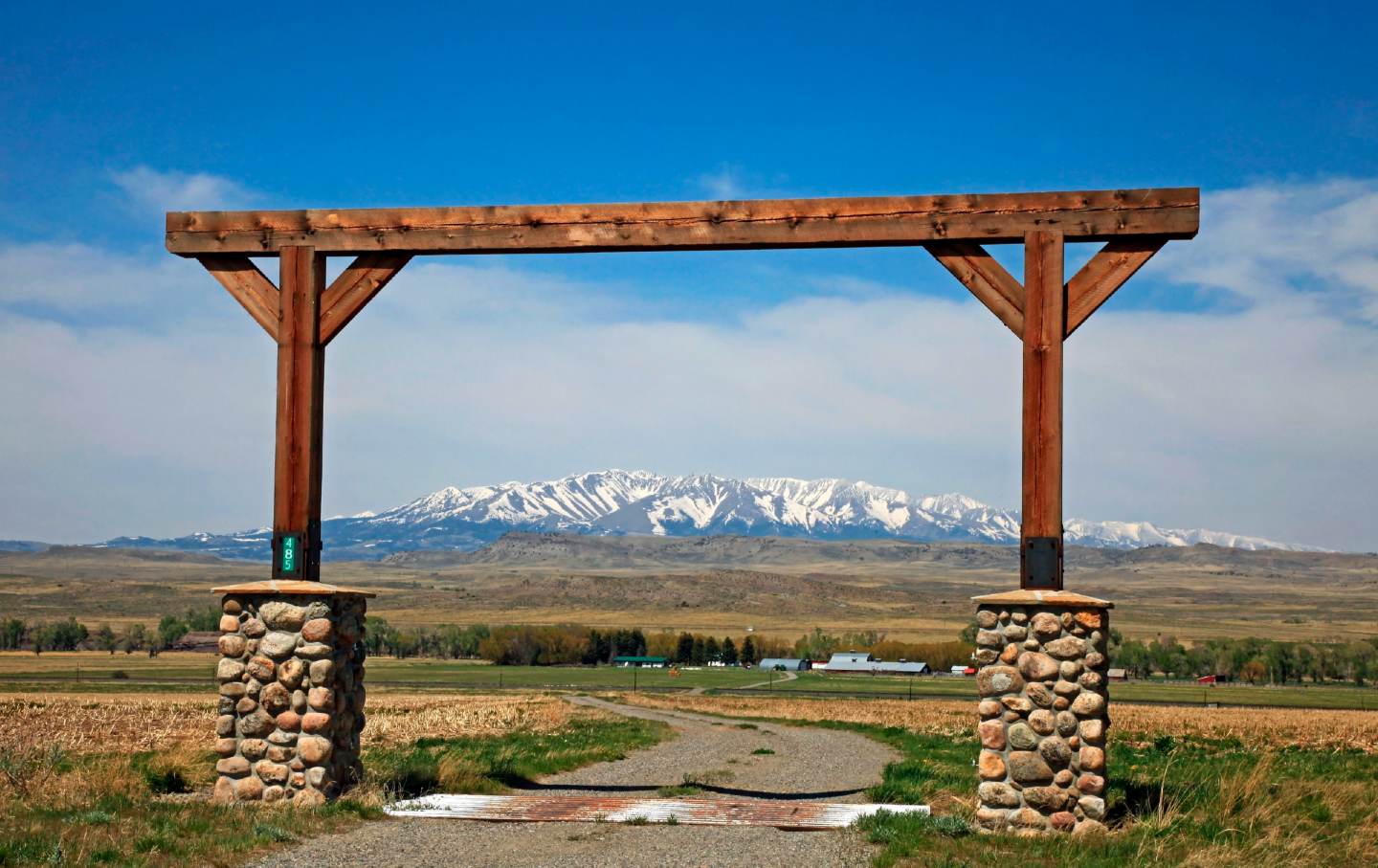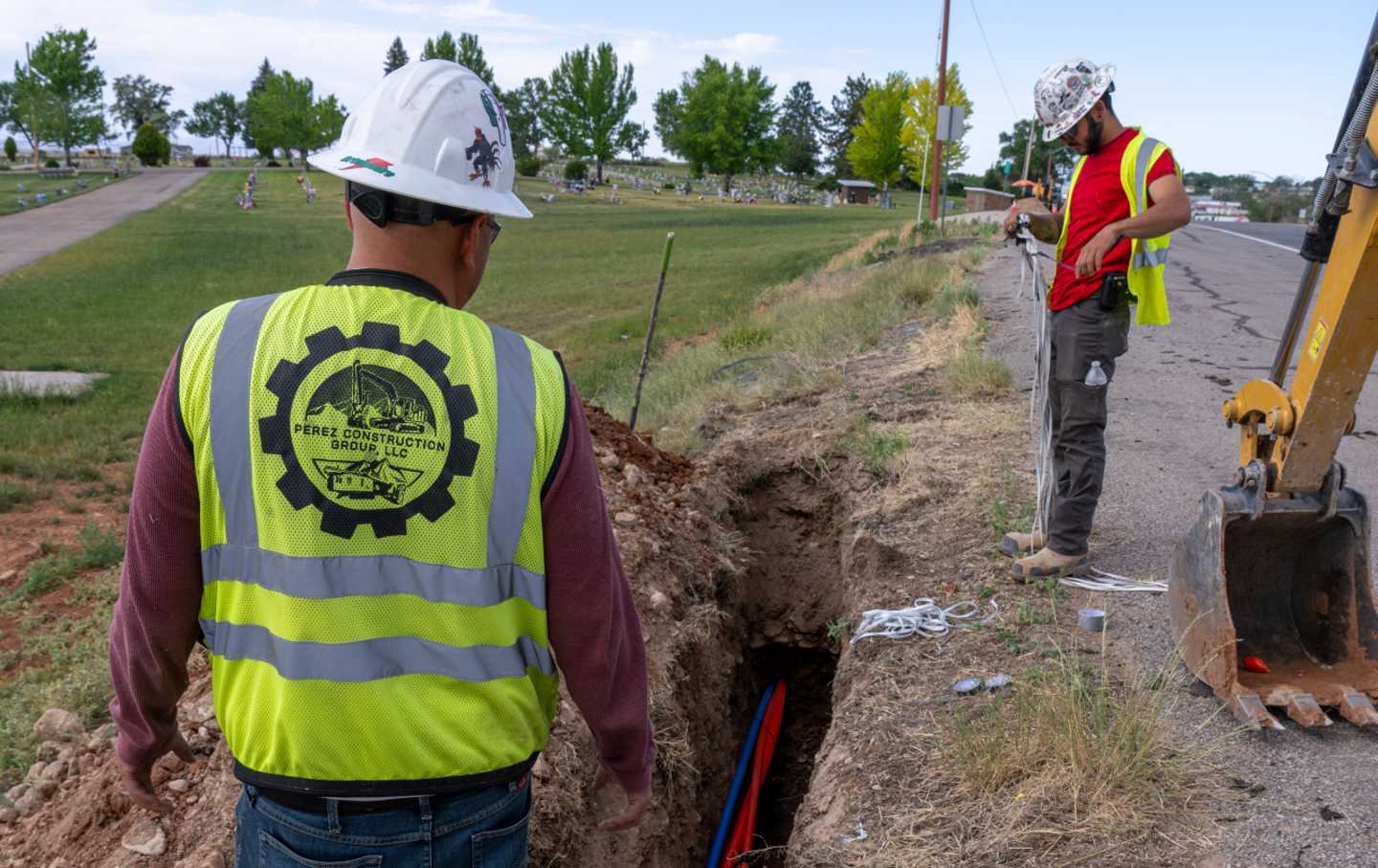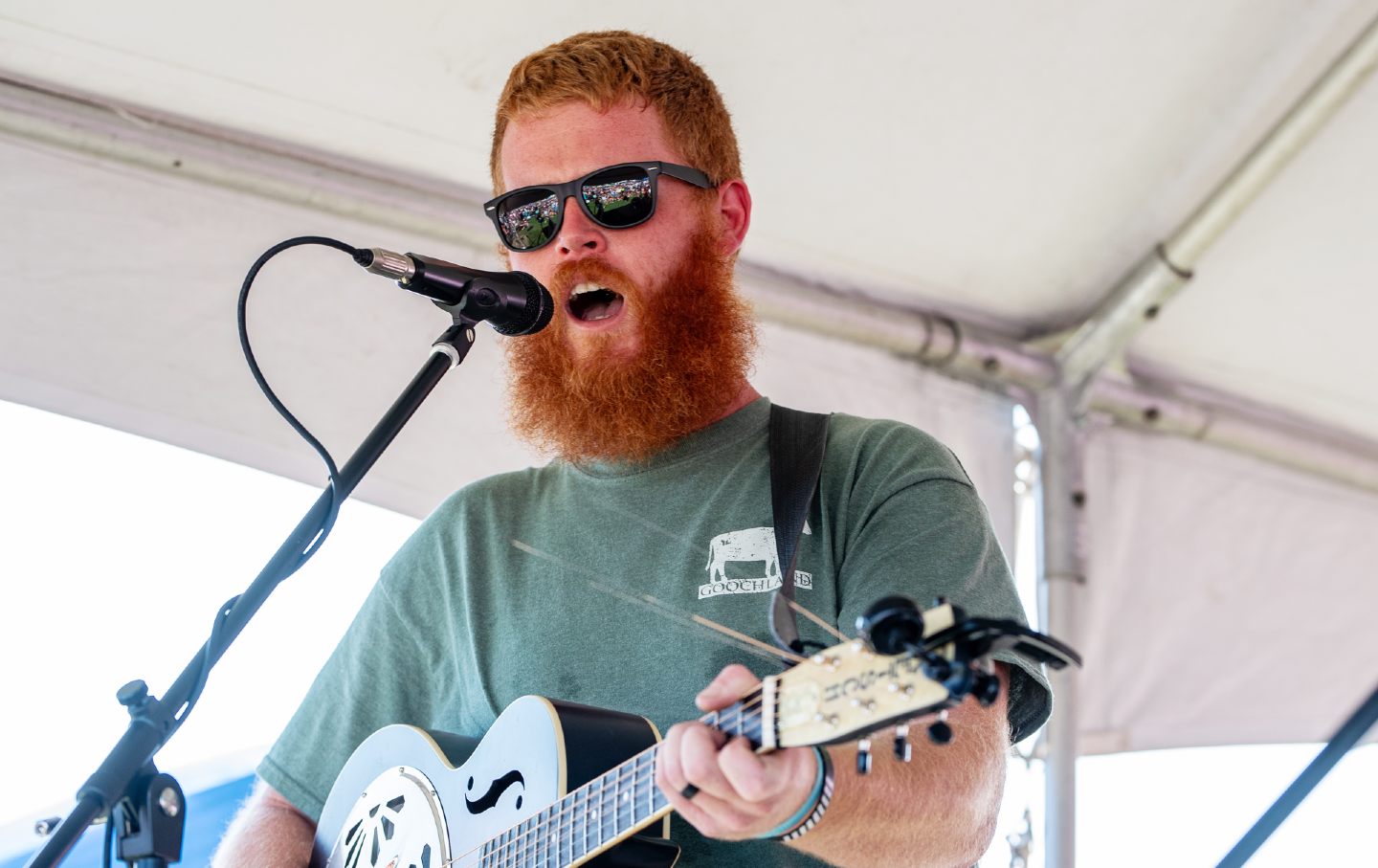Society
/
Rethinking Rural
/
March 27, 2025
The greater Bozeman, Montana, region has become ground zero for rampant luxury development that is taking the “public” out of public lands.


It’s a breezy afternoon, and Keegan Nashan is standing on a county road in Clyde Park, Montana, yelling at golfers: “No one wants you here, even if they’re smiling while they’re serving you.” With the aim of further annoying them, she’s set up bluetooth speakers that blare “Rednecker Than You” on auto-replay.
These are no ordinary golfers. They are individuals who have paid seven figures to join the ultra-elite Crazy Mountain Ranch, an invitation-only club that promises an experience that “truly embodies the nature & spirit of Montana.”
Nashan, 31, was born and raised in Livingston, a small town near Bozeman. She’s watched for decades as out-of-state investors have acquired public and private lands and developed them into gated communities and exclusive resorts for some of the richest people in the world.
It began, in 1997, with the Yellowstone Club, a “mountain sanctuary” where billionaires ski, golf and build 8,000 square foot second, third, and fourth homes. The land rush has continued apace, with Boston-based Cross Harbor Capital Partners purchasing the18,000-acre Crazy Mountain Ranch in 2021.
“Cross Harbor basically owns Big Sky,” Nashan told me. “I’m worried for the culture of this place.” (Big Sky is an unincorporated area bordering Bozeman that, by Nashan’s count, boasts at least 30 private ranches or high-end resorts).
She’s right to worry. Montana is a checkerboard of public lands surrounded by private parcels. Prior to the luxury development boom, most private landowners allowed public access to adjacent public lands. But today, many of those trails are obstructed with locked gates and “no trespassing” signs. Longtime residents, who trace their roots back five generations (for Crow Indians, even longer), are suddenly unable to enter the places they’ve walked, hunted, fished, foraged, and prayed in their whole lives.
Current Issue

Kal Munis, a political scientist at Auburn University, spent his childhood on the public lands of western Montana, sometimes for fun, sometimes out of necessity. “When the mine [where his father worked] shut down, we suddenly had to get our dinner from the creeks and the hills.” To this day, Munis says, it’s not uncommon for working-class Montanans to provide for themselves by hunting and fishing on public lands. When their access is suddenly blocked, that is no small problem.
Sustenance aside, families like Munis’s didn’t take vacations to Disneyland; their leisure time was spent picking huckleberries, camping, and fishing on public lands and on private ranches whose longtime owners customarily allowed locals access. Today, many of those ranches have been sold off to resort developers and wealthy urbanites eager to live the Montana dream… in seclusion. “These places become the king’s forest, and the commoners don’t get to go in the king’s forest,” Munis says.
What most Americans probably don’t even realize (including me until I looked it up last week) is this: Forty percent of the United States is public land with even higher proportions in Montana and several other Western states. Federal land cannot be sold off—at least, not easily—but there’s nothing to stop it from being encircled by private parcels that keep the public out. , Meanwhile, Interior Secretary Doug Burgum, a real estate magnate whose net worth has been estimated at $100 million, has suggested opening up federal lands to fossil fuel extraction—or selling them off altogether.
Montana state legislator Jane Weber worries that the Trump administration will turn federal public lands over to the state of Montana and that those lands will eventually be sold off to private developers. Weber, a forester by profession, says the state lacks the funds and expertise to manage vast tracts of land for wildfire and logging. She predicts that, once the state belatedly concedes its incompetence, it will sell the land to wealthy outsiders, “and we the public are going to lose our land.”
Weber also worries about the loss of grazing and farmland, as private ranches adjacent to national forests are bought and converted into private hunting grounds. Between 2017 and 2022, 10 percent of the state’s farms and ranches disappeared. 93 percent of those farms were family owned and operated. Given the volume of grains, beef, oilseeds, and legumes Montana supplies the nation, this trend is something that ought to concern everyone.
Weber bemoans the irony of Montana being gentrified by affluent urbanites charmed by the state’s beauty and lifestyle—only to start demanding upscale housing and amenities upon arrival. A prime example is The Ranch at Rock Creek, a once-upon-a-time working cattle ranch that now invites guests to “channel the pioneer spirit that encouraged our homesteaders to ascend the next peak.” In addition to their $6,500 a night stay in a tricked-out horse stable, guests can pay $300 for a “Sapphire hydration wrap,” just like ye olde homesteaders used to enjoy.
Popular
“swipe left below to view more authors”Swipe →
As gentrification and gentri-vacation drives up housing costs and transforms the culture, locals are plenty mad.
Which brings us back to Keegan Nashan. “I do this because I’m mad. I always wanted to build a home and raise a family here, but with housing prices what they are now, that’s no longer feasible for me or people who grew up here. I’m not anti-development, and I don’t begrudge people for wanting to come here, but we need somewhere to live.”
Montanans are fired up. They’ve got bumper stickers on their pickups telling the Yellowstone Club and Crazy Mountain Ranch to fuck themselves. Some of them stand on the same county road Nashan does holding shotguns. On March 8, a thousand protesters rallied for public lands in Missoula, drawing attention to an issue that is seldom on the national radar screen, even as DOGE savages public lands workforces.
Resentment against capitalist destruction of Montanans’ natural heritage cuts across partisan lines. Rural residents value public lands even more than urban folks do, according to a 2021 survey conducted by Munis and Zoe Nemerever. Democrats and Republicans are equally supportive of public lands, although those who identify as “strong Democrats” are actually less supportive. And unlikely coalitions of ranchers, environmentalists, and “hook and bullet” advocacy groups like Backcountry Hunters & Anglers have banded together to challenge developers and sue them over environmental degradation and obstruction of public access.
It’s not only the opposition that’s bipartisan—it’s the problem itself. A recent Crazy Mountain Ranch land swap was approved by the Forest Service under Biden. Such swaps may look fair on paper but are often lopsided, with the private party trading relatively barren, depleted acres for more valuable, resource-rich land that is then degraded by development.
John Sullivan, former chair of the Montana chapter of Backcountry Hunters and Anglers slammed the Crazy Mountain land swap: “We are deeply disappointed that the Forest Service has caved to big money and their never-ending goal to lock the public out of public land. Despite overwhelming public opposition from everyday Montanans, the USFS bent the knee to the wealthy and rewarded the illegal actions of landowners who have for years sought private enclaves of extremely valuable public land.”
For longtime Montanans, public land is a priceless treasure, their natural heritage inscribed in the ground they walk upon, the waters that run through it, and the bounty of plants and animals the land sustains. But to investors, developers, and too many politicians, land is nothing more than numbers on a balance sheet. And so does Montana become the king’s forest while the commoners stand on the edges and yell.
Donald Trump’s cruel and chaotic second term is just getting started. In his first month back in office, Trump and his lackey Elon Musk (or is it the other way around?) have proven that nothing is safe from sacrifice at the altar of unchecked power and riches.
Only robust independent journalism can cut through the noise and offer clear-eyed reporting and analysis based on principle and conscience. That’s what The Nation has done for 160 years and that’s what we’re doing now.
Our independent journalism doesn’t allow injustice to go unnoticed or unchallenged—nor will we abandon hope for a better world. Our writers, editors, and fact-checkers are working relentlessly to keep you informed and empowered when so much of the media fails to do so out of credulity, fear, or fealty.
The Nation has seen unprecedented times before. We draw strength and guidance from our history of principled progressive journalism in times of crisis, and we are committed to continuing this legacy today.
We’re aiming to raise $25,000 during our Spring Fundraising Campaign to ensure that we have the resources to expose the oligarchs and profiteers attempting to loot our republic. Stand for bold independent journalism and donate to support The Nation today.
Onward,
Katrina vanden Heuvel
Editorial Director and Publisher, The Nation
More from
Erica Etelson

As recent events bear out, when Thomas Frank lamented, “We’ll have to drag the Democrats kicking and screaming to victory” in 2017, if anything he was understating the challenge.
Column
/
Erica Etelson

Working- and middle-class Americans take pride in their work. If Democrats want to win their votes, they need to acknowledge and appeal to that pride, not dismiss or patronize it….
Column
/
Erica Etelson

What tone-deaf liberals can’t hear in Rich Men North of Richmond.
Erica Etelson



